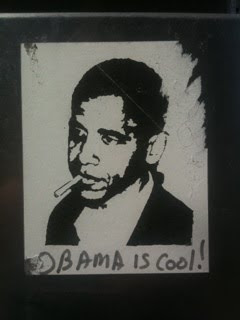Tuesday, August 31, 2010
Monday, August 30, 2010
Building a Nation of Know-Nothings - NYTimes.com
Building a Nation of Know-Nothings - NYTimes.com:
It would be nice to dismiss the stupid things that Americans believe as harmless, the price of having such a large, messy democracy. Plenty of hate-filled partisans swore that Abraham Lincoln was a Catholic and Franklin Roosevelt was a Jew. So what if one-in-five believe the sun revolves around the earth, or aren’t sure from which country the United States gained its independence?
But false belief in weapons of mass-destruction led the United States to a trillion-dollar war. And trust in rising home value as a truism as reliable as a sunrise was a major contributor to the catastrophic collapse of the economy. At its worst extreme, a culture of misinformation can produce something like Iran, which is run by a Holocaust denier.
It’s one thing to forget the past, with predictable consequences, as the favorite aphorism goes. But what about those who refuse to comprehend the present?
It would be nice to dismiss the stupid things that Americans believe as harmless, the price of having such a large, messy democracy. Plenty of hate-filled partisans swore that Abraham Lincoln was a Catholic and Franklin Roosevelt was a Jew. So what if one-in-five believe the sun revolves around the earth, or aren’t sure from which country the United States gained its independence?
But false belief in weapons of mass-destruction led the United States to a trillion-dollar war. And trust in rising home value as a truism as reliable as a sunrise was a major contributor to the catastrophic collapse of the economy. At its worst extreme, a culture of misinformation can produce something like Iran, which is run by a Holocaust denier.
It’s one thing to forget the past, with predictable consequences, as the favorite aphorism goes. But what about those who refuse to comprehend the present?
Friday, August 27, 2010
Thursday, August 26, 2010
Albee on Albee - Page 1 - Theater - New York - Village Voice
Albee on Albee - Theater - New York - Village Voice:
VV: And now you're back Off-Broadway with a new play.
EA: I much prefer being Off-Broadway. Always have. The audiences are younger and more intelligent. Well, younger and/or more intelligent. The theaters are the proper size. The only problem there is the economics of the theater. The people who run the economics of the theater should be shot.
VV: And now you're back Off-Broadway with a new play.
EA: I much prefer being Off-Broadway. Always have. The audiences are younger and more intelligent. Well, younger and/or more intelligent. The theaters are the proper size. The only problem there is the economics of the theater. The people who run the economics of the theater should be shot.
Monday, August 23, 2010
Friday, August 20, 2010
The Observatory | Joseph Clarke
The Observatory | Joseph Clarke:
In central New Delhi, near the upscale Connaught Place shopping hub, the only remaining traditional architecture is an outdoor astronomical observatory built by an enlightened maharajah in the eighteenth century. Jantar Mantar (or Yantra Mandir, meaning “temple of instruments”) is a group of large stone and masonry structures calibrated to chart the movement of celestial bodies. Now a regular stop on the Delhi architectural circuit, the cryptic, ruinous objects retain a sense of scientific exactitude, an aura of REXesque “hyper-rationality.”
The surrounding horizon is dominated by the silhouettes of knockoff-brutalist office towers that have been thrown up more recently to accommodate the country’s burgeoning economy. From the center of Jantar Mantar, these blank concrete forms could be mistaken for oversized copies of the astronomical devices–as though they, too, were precision instruments whose heroically vacant surfaces were the geometrical traces of an otherworldly logic.
In central New Delhi, near the upscale Connaught Place shopping hub, the only remaining traditional architecture is an outdoor astronomical observatory built by an enlightened maharajah in the eighteenth century. Jantar Mantar (or Yantra Mandir, meaning “temple of instruments”) is a group of large stone and masonry structures calibrated to chart the movement of celestial bodies. Now a regular stop on the Delhi architectural circuit, the cryptic, ruinous objects retain a sense of scientific exactitude, an aura of REXesque “hyper-rationality.”
The surrounding horizon is dominated by the silhouettes of knockoff-brutalist office towers that have been thrown up more recently to accommodate the country’s burgeoning economy. From the center of Jantar Mantar, these blank concrete forms could be mistaken for oversized copies of the astronomical devices–as though they, too, were precision instruments whose heroically vacant surfaces were the geometrical traces of an otherworldly logic.
Controlling the Interface | Arts | Portland Mercury
Controlling the Interface | Arts | Portland Mercury:
PORTLAND HAS A CRUSH on monologist Mike Daisey, and with damn good reason: Daisey's performances fulfill the often empty promise of theater as a transformative medium. His monologues are propelled by curiosity, anger, and a streak of stubborn, Vonnegut-esque humanism, as he takes on topics ranging from Amazon to the Department of Homeland Security to the American theater system.
PORTLAND HAS A CRUSH on monologist Mike Daisey, and with damn good reason: Daisey's performances fulfill the often empty promise of theater as a transformative medium. His monologues are propelled by curiosity, anger, and a streak of stubborn, Vonnegut-esque humanism, as he takes on topics ranging from Amazon to the Department of Homeland Security to the American theater system.
Thursday, August 19, 2010
Video/transcript @RodBegbie asks Facebook's Zuckerberg how to remove his home address from public Places - DAILY VIOLET
Video/transcript @RodBegbie asks Facebook's Zuckerberg how to remove his home address from public Places - DAILY VIOLET:
@RodBegbie
First question, quick question, eh you mentioned privacy controls -- over here, by the way -- and you mentioned privacy controls for check-ins and for people, I'm wondering what privacy controls are for locations, if someone creates a venue for my apartment when I'm having a party, em, what controls do I have to remove it and get my address off of Facebook?
Zuckerberg
(pause: hands microphone to engineer)
Facebook Places Engineer
Um, by default when you create Places we do tell you that they *are* public places… so by intention we expect these to be public places *but* we have various visibility rules that decide when places become public -- uh -- on a wider level, so if you create a place, usually it's only going to be visible to you, and your friends, but if enough people check in, uh, we try to determine that hey, there is a place that a lot of people are interested in, then we promote it to be public.
@RodBegbie
But do I have any control to shut it down?
Facebook Places Engineer
Uh, you can take it down, you can, like, delete it.
@RodBegbie
Even if someone else created it?
Facebook Places Engineer
Uh, you can report it if somebody else created it -- yeah, you can flag a place, so if something is offensive or you don't like it you can flag it, and if enough people do it we'll take it down.
@RodBegbie
But, what if I'm the only one who flags it, because it's my apartment?
Facebook Places Engineer
If you are the one who created it--
@RodBegbie
What if someone else created it while I was having the party? Do I have the power to remove it?
Facebook Places Engineer
Yeah, you'll have to flag it to remove it, yeah.
@RodBegbie
First question, quick question, eh you mentioned privacy controls -- over here, by the way -- and you mentioned privacy controls for check-ins and for people, I'm wondering what privacy controls are for locations, if someone creates a venue for my apartment when I'm having a party, em, what controls do I have to remove it and get my address off of Facebook?
Zuckerberg
(pause: hands microphone to engineer)
Facebook Places Engineer
Um, by default when you create Places we do tell you that they *are* public places… so by intention we expect these to be public places *but* we have various visibility rules that decide when places become public -- uh -- on a wider level, so if you create a place, usually it's only going to be visible to you, and your friends, but if enough people check in, uh, we try to determine that hey, there is a place that a lot of people are interested in, then we promote it to be public.
@RodBegbie
But do I have any control to shut it down?
Facebook Places Engineer
Uh, you can take it down, you can, like, delete it.
@RodBegbie
Even if someone else created it?
Facebook Places Engineer
Uh, you can report it if somebody else created it -- yeah, you can flag a place, so if something is offensive or you don't like it you can flag it, and if enough people do it we'll take it down.
@RodBegbie
But, what if I'm the only one who flags it, because it's my apartment?
Facebook Places Engineer
If you are the one who created it--
@RodBegbie
What if someone else created it while I was having the party? Do I have the power to remove it?
Facebook Places Engineer
Yeah, you'll have to flag it to remove it, yeah.
Consulate General of the United States Hyderabad, India - Mike Daisey -The Agony and The Ecstasy of Steve Jobs
Consulate General of the United States Hyderabad, India - Mike Daisey -The Agony and The Ecstasy of Steve Jobs:
Just as the crowds at the Indian School of Business auditorium were getting restless, a large beefy man made his appearance on stage. As the blue back lights dimmed and the bright lights lit up his face, Mike Daisey, the New York-based monologue artist settled himself at the table and began telling of Steve Jobs’ obsessions and ruthlessness.
The audience, students, IT professionals and theater enthusiasts, listened with rapt attention. The U.S. Consulate General Hyderabad sponsored Mr. Daisey’s two-day visit to Hyderabad, August 16 and 17. In addition to a performance at Indian School of Business, Mr. Daisey led a two-hour workshop for young artists from the theater group Samhaara.
Just as the crowds at the Indian School of Business auditorium were getting restless, a large beefy man made his appearance on stage. As the blue back lights dimmed and the bright lights lit up his face, Mike Daisey, the New York-based monologue artist settled himself at the table and began telling of Steve Jobs’ obsessions and ruthlessness.
The audience, students, IT professionals and theater enthusiasts, listened with rapt attention. The U.S. Consulate General Hyderabad sponsored Mr. Daisey’s two-day visit to Hyderabad, August 16 and 17. In addition to a performance at Indian School of Business, Mr. Daisey led a two-hour workshop for young artists from the theater group Samhaara.
Monday, August 16, 2010
The Hindu : Arts : Citizen reviews of The Agony and Ectasy of Steve Jobs
The Hindu : Arts : Citizen reviews of The Agony and the Ecstasy of Steve Jobs:
The irony of Mike Daisey's ‘monologue' was that though the genre of his performance fitted that label, the essence of it hardly did. Along with his director Jean-Michele Gregory, he literally brought to the table (Mike performs on-stage seated at a table with a glass of water and his notes) issues that should bother any free-thinking person. Taking the role of a spokesman of the people of the world, his seamless narrative, interspersed with laughter and clapping, questioned our addiction to technology, and our constant need to upgrade it. Mike took digs at Apple CEO Steve Jobs for his obsession with design. He described his visit as a businessman to a factory in Shenzhen in China where workers were being treated inhumanly. Can we take a leaf out of Mike's book and speak up for ourselves?
The irony of Mike Daisey's ‘monologue' was that though the genre of his performance fitted that label, the essence of it hardly did. Along with his director Jean-Michele Gregory, he literally brought to the table (Mike performs on-stage seated at a table with a glass of water and his notes) issues that should bother any free-thinking person. Taking the role of a spokesman of the people of the world, his seamless narrative, interspersed with laughter and clapping, questioned our addiction to technology, and our constant need to upgrade it. Mike took digs at Apple CEO Steve Jobs for his obsession with design. He described his visit as a businessman to a factory in Shenzhen in China where workers were being treated inhumanly. Can we take a leaf out of Mike's book and speak up for ourselves?
Sunday, August 15, 2010
Tony Kushner Q&A: Angels approaching | Upstaged | Time Out New York
Tony Kushner Q&A: Angels approaching | Upstaged | Time Out New York:
To you, what’s the most appealing thing about the theater, as opposed to movies or television?
I think the fact that it’s not a commodity form and that it’s living and alive, that it isn’t an object. It isn’t a finished thing. It’s a process. I certainly expect to do some rewriting on Perestroika when Angels opens, but even if the play is more or less done, the theatrical event, the live event is not. It asks people to engage collectively in a relationship with an event, with an action, with a field of meaning and not with a thing, not with an object—and to engage in an event that will respond and be transformed by the degree of your engagement with it. So it has a fluidity in that sense, and a completely human quality, that I think no recorded event can have—which isn’t to say that theater is superior, but it’s a different kind of experience, and the difficulties and awkwardnesses and inconveniences and imperfections of theater are all part of the power of theatricality.
To you, what’s the most appealing thing about the theater, as opposed to movies or television?
I think the fact that it’s not a commodity form and that it’s living and alive, that it isn’t an object. It isn’t a finished thing. It’s a process. I certainly expect to do some rewriting on Perestroika when Angels opens, but even if the play is more or less done, the theatrical event, the live event is not. It asks people to engage collectively in a relationship with an event, with an action, with a field of meaning and not with a thing, not with an object—and to engage in an event that will respond and be transformed by the degree of your engagement with it. So it has a fluidity in that sense, and a completely human quality, that I think no recorded event can have—which isn’t to say that theater is superior, but it’s a different kind of experience, and the difficulties and awkwardnesses and inconveniences and imperfections of theater are all part of the power of theatricality.
Read
Take This Job and Shove It:
The economy has been growing for a year, and corporate profits have surged—Standard & Poor's estimates that profits of the constituents of the S&P 500 rose nearly 52 percent in the second quarter of 2010 from 2009. Much of that impressive profit growth has been driven by the remarkable gains in efficiency and productivity that corporate America has notched since the recession took hold. Last year, productivity—the ability to produce more with less—soared 3.5 percent, up from 1 percent in 2008 and 1.6 percent in 2007. Yes, companies embraced the Gospel of Cost Cutting with missionary zeal—printing on both sides of the paper, eliminating bottled water, turning off the lights. But most of the gains came straight out of payroll. Companies slashed salaries and curtailed benefits, all while asking shell-shocked veterans to pick up the slack for downsized colleagues. Even as business has picked up, companies have been extremely slow to hire; the private sector has added just 630,000 jobs so far this year. And when it comes to wages and benefits, corporate America's bean counters could make Scrooge blush. Many of the firms that slashed pay or cut 401(K) matches haven't restored them even though their balance sheets are in rude health.
Look, unemployment can be enormously stressful. But under today's conditions, employment can also get on your nerves. Steven Slater's cathartic meltdown came several hours before a government release signaled that companies have pushed workers about as far as they can go. For the past year, the U.S. economy has been prodding workers to do more, produce more, serve more, with each passing week, without much assistance, and without much of a raise. Over the past four quarters, BLS reported, "unit labor costs fell 2.8 percent as output per hour increased faster than hourly compensation." But when the Bureau of Labor Statistics reported the second-quarter productivity numbers on Tuesday, Aug. 10, the results were a little shocking. For the first time in several years, productivity actually fell—at a 0.9 percent annual rate. Workers put in more hours, but output didn't keep up. They simply can't run any faster.
Friday, August 13, 2010
travelmonkeys: Woah. We're in India.
travelmonkeys: Woah. We're in India.:
MIKE: No, there's no music. (pause) No, I don't sing. (pause) No, no, no poetry. I just sit there and tell a story. (pause) 58? No, no, I'm 37. (pause) Self-taught. (pause) No, I will not recite a line for you. That's not how it works. (pause) Well, just because it's not written doesn't mean it's not composed. (pause) (pause) (pause) Well if you don't understand why Indians would care about what's happening in China--when you're both competing for the same markets, when corporations are moving their operations from China to India because they want to use your people in the same way they've used the Chinese--if you can't see why that would pertain to you, then you're just blind or have no imagination. (pause) Yes, thank you for your time. Goodbye.
MIKE: No, there's no music. (pause) No, I don't sing. (pause) No, no, no poetry. I just sit there and tell a story. (pause) 58? No, no, I'm 37. (pause) Self-taught. (pause) No, I will not recite a line for you. That's not how it works. (pause) Well, just because it's not written doesn't mean it's not composed. (pause) (pause) (pause) Well if you don't understand why Indians would care about what's happening in China--when you're both competing for the same markets, when corporations are moving their operations from China to India because they want to use your people in the same way they've used the Chinese--if you can't see why that would pertain to you, then you're just blind or have no imagination. (pause) Yes, thank you for your time. Goodbye.
Wednesday, August 11, 2010
The Agony and the Ecstasy of Steve Jobs: Mike Daisey Goes to China So You Can Change The World by Jen Graves - Theater - The Stranger, Seattle's Only Newspaper
The Agony and the Ecstasy of Steve Jobs: Mike Daisey Goes to China So You Can Change The World:
There have been fingers inside your iPhone; they were wiped away with alcohol before you got it. The iPhone, in other words, was made not by machines but by fingers (fingers are cheaper). The fingers that do the work are located in a humongous factory complex in Shenzhen, China, at a company called Foxconn, which employs 800,000 people, where earlier this year workers were flinging themselves off the buildings to their deaths. The reason for the suicides was the iPhone 4. Conditions that are already very bad become apparently unbearable when the American market is about to receive a new, improved product, so people die. This is not something that anyone is particularly exercised about. But something changes when you find out that your gleaming iPhone once had fingers inside it; in computer terms, this introduces a virus into your system of thinking: Your handheld device never was hands-free. Mike Daisey went to Shenzhen for three weeks, stood outside Foxconn, and shook these hands. And he has just begun planting the virus he picked up there. Last weekend, a tiny but potent dose of it hit Seattle.
There have been fingers inside your iPhone; they were wiped away with alcohol before you got it. The iPhone, in other words, was made not by machines but by fingers (fingers are cheaper). The fingers that do the work are located in a humongous factory complex in Shenzhen, China, at a company called Foxconn, which employs 800,000 people, where earlier this year workers were flinging themselves off the buildings to their deaths. The reason for the suicides was the iPhone 4. Conditions that are already very bad become apparently unbearable when the American market is about to receive a new, improved product, so people die. This is not something that anyone is particularly exercised about. But something changes when you find out that your gleaming iPhone once had fingers inside it; in computer terms, this introduces a virus into your system of thinking: Your handheld device never was hands-free. Mike Daisey went to Shenzhen for three weeks, stood outside Foxconn, and shook these hands. And he has just begun planting the virus he picked up there. Last weekend, a tiny but potent dose of it hit Seattle.
Tuesday, August 10, 2010
America
Then one of the students with blue hair and a tongue stud
Says that America is for him a maximum-security prison
Whose walls are made of RadioShacks and Burger Kings,
and MTV episodes
Where you can’t tell the show from the commercials,
And as I consider how to express how full of shit I think he is,
He says that even when he’s driving to the mall in his Isuzu
Trooper with a gang of his friends, letting rap music pour over them
Like a boiling Jacuzzi full of ballpeen hammers, even then he feels
Buried alive, captured and suffocated in the folds
Of the thick satin quilt of America
And I wonder if this is a legitimate category of pain,
or whether he is just spin doctoring a better grade,
And then I remember that when I stabbed my father in the dream last night,
It was not blood but money
That gushed out of him, bright green hundred-dollar bills
Spilling from his wounds, and—this is the weird part—,
He gasped “Thank god—those Ben Franklins were
Clogging up my heart—
And so I perish happily,
Freed from that which kept me from my liberty”—
Which was when I knew it was a dream, since my dad
Would never speak in rhymed couplets,
And I look at the student with his acne and cell phone and phony ghetto clothes
And I think, “I am asleep in America too,
And I don’t know how to wake myself either,”
And I remember what Marx said near the end of his life:
“I was listening to the cries of the past,
When I should have been listening to the cries of the future.”
But how could he have imagined 100 channels of 24-hour cable
Or what kind of nightmare it might be
When each day you watch rivers of bright merchandise run past you
And you are floating in your pleasure boat upon this river
Even while others are drowning underneath you
And you see their faces twisting in the surface of the waters
And yet it seems to be your own hand
Which turns the volume higher?
Tony Hoagland
Then one of the students with blue hair and a tongue stud
Says that America is for him a maximum-security prison
Whose walls are made of RadioShacks and Burger Kings,
and MTV episodes
Where you can’t tell the show from the commercials,
And as I consider how to express how full of shit I think he is,
He says that even when he’s driving to the mall in his Isuzu
Trooper with a gang of his friends, letting rap music pour over them
Like a boiling Jacuzzi full of ballpeen hammers, even then he feels
Buried alive, captured and suffocated in the folds
Of the thick satin quilt of America
And I wonder if this is a legitimate category of pain,
or whether he is just spin doctoring a better grade,
And then I remember that when I stabbed my father in the dream last night,
It was not blood but money
That gushed out of him, bright green hundred-dollar bills
Spilling from his wounds, and—this is the weird part—,
He gasped “Thank god—those Ben Franklins were
Clogging up my heart—
And so I perish happily,
Freed from that which kept me from my liberty”—
Which was when I knew it was a dream, since my dad
Would never speak in rhymed couplets,
And I look at the student with his acne and cell phone and phony ghetto clothes
And I think, “I am asleep in America too,
And I don’t know how to wake myself either,”
And I remember what Marx said near the end of his life:
“I was listening to the cries of the past,
When I should have been listening to the cries of the future.”
But how could he have imagined 100 channels of 24-hour cable
Or what kind of nightmare it might be
When each day you watch rivers of bright merchandise run past you
And you are floating in your pleasure boat upon this river
Even while others are drowning underneath you
And you see their faces twisting in the surface of the waters
And yet it seems to be your own hand
Which turns the volume higher?
Tony Hoagland
Monday, August 09, 2010
Friday, August 06, 2010
Thursday, August 05, 2010
Tuesday, August 03, 2010
Monologist Mike Daisey on Falmouth stage to advocate for tech workers in China - The Boston Globe
Talking up workers’ plight - A Mac fan, monologist Mike Daisey also advocates for tech employees in China:
On the tech-geek continuum, monologist Mike Daisey knows precisely where he resides. It’s a respectably savvy spot, especially for a theater guy.
“I can field-strip my MacBook Pro into all of its component pieces and reassemble it in about 40 minutes,’’ he was saying the other day, sitting beneath the pressed-tin ceiling of an Italian restaurant in his neighborhood, eating a late lunch of meatballs and beet-and-avocado salad. “I do that sometimes and then clean all the parts with compressed air because I find it soothing, and then I put it back together.’’ A pause in his rapid-fire speech, followed by a clarification: “But there are people who are much geekier than me.’’
On the tech-geek continuum, monologist Mike Daisey knows precisely where he resides. It’s a respectably savvy spot, especially for a theater guy.
“I can field-strip my MacBook Pro into all of its component pieces and reassemble it in about 40 minutes,’’ he was saying the other day, sitting beneath the pressed-tin ceiling of an Italian restaurant in his neighborhood, eating a late lunch of meatballs and beet-and-avocado salad. “I do that sometimes and then clean all the parts with compressed air because I find it soothing, and then I put it back together.’’ A pause in his rapid-fire speech, followed by a clarification: “But there are people who are much geekier than me.’’
The Hindu : Life & Style / Metroplus : The last witness
The Hindu : Life & Style / Metroplus : The last witness:
He's the voice of witness. Your feisty guide to a world you quickly realise you have never completely understood. Mike Daisey, relentlessly truthful and unexpectedly hilarious, traces the story of Apple CEO Steve Jobs and how his deep obsessions have shaped the way we think, and the way we live.
He's the voice of witness. Your feisty guide to a world you quickly realise you have never completely understood. Mike Daisey, relentlessly truthful and unexpectedly hilarious, traces the story of Apple CEO Steve Jobs and how his deep obsessions have shaped the way we think, and the way we live.
Monday, August 02, 2010
Man faces jail for videotaping gun-waving cop - Boing Boing
Man faces jail for videotaping gun-waving cop - Boing Boing:
Police officer Joseph Uhler was caught on film charging out of his unmarked car and waving his gun at a unarmed motorcyclist pulled over for speeding. When the footage was uploaded to YouTube, authorities raided Anthony Graber's home, siezed his computers, arrested him, and charged him with "wiretapping" offenses that could land him in jail for 16 years.
Police officer Joseph Uhler was caught on film charging out of his unmarked car and waving his gun at a unarmed motorcyclist pulled over for speeding. When the footage was uploaded to YouTube, authorities raided Anthony Graber's home, siezed his computers, arrested him, and charged him with "wiretapping" offenses that could land him in jail for 16 years.





































